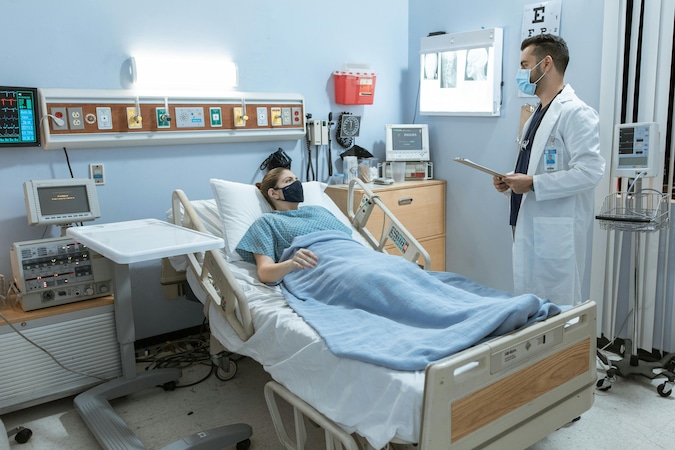
Discharge Planning for a Smooth Transition Home

Discharge planning is essential for ensuring a safe and smooth transition from the hospital to home. It includes coordinating medical care, arranging follow-up appointments, and preparing your home environment to prevent complications. This process is critical for reducing readmission rates and ensuring long-term recovery.
Preparing for your hospital discharge means understanding the process, organizing follow-up care, and ensuring you have the support you need. At SelfGood , we empower patients and caregivers with the resources to make informed healthcare decisions, offering expert guidance to ensure a successful recovery.
Key Takeaways:
- Understand the steps involved in discharge planning.
- Prepare your home environment and support system before leaving the hospital.
- Arrange follow-up appointments and home healthcare services if needed.
- Manage medications and maintain communication with your healthcare team.
What Is Discharge Planning and Why It’s Important

Discharge planning is the process of ensuring you have everything you need for a safe and effective transition from hospital care to home. It involves organizing post-hospital care, medications, follow-up appointments, and ensuring your home is ready for recovery.
A comprehensive discharge plan reduces the risk of complications, such as missed medications or misunderstandings about your care. It also helps prevent readmission to the hospital by addressing potential issues before you leave.
Your healthcare team, including doctors, nurses, and case managers, plays a critical role in preparing your discharge plan. Their goal is to make sure you are informed, supported, and ready to continue your recovery at home.
What to Expect from the Discharge Process
The discharge process involves several steps to ensure you’re ready to leave the hospital:
- Role of the healthcare team: Your healthcare team will assess your condition and decide when it’s safe for you to go home. They’ll collaborate with you to create a personalized discharge plan.
- Necessary documentation: You will receive a discharge summary that includes your diagnosis, treatments, and recommendations for post-hospital care. Ensure you also get any prescriptions and instructions for taking medications.
- Discharge instructions: These will include specific guidelines on how to care for yourself at home, what symptoms to watch for, and when to schedule follow-up appointments. Make sure you understand and ask questions if anything is unclear.
Effective discharge planning involves clear communication between you and your healthcare providers to make sure you have all the information and resources needed for a smooth recovery.
Preparing for Your Hospital Discharge: Key Considerations
Before leaving the hospital, you should make sure you’re fully prepared. Here are the key considerations to address:
- Understanding your condition and treatment: You need to clearly understand your diagnosis and what steps to take if your symptoms worsen. Don’t hesitate to ask questions if anything is unclear.
- Medication management: Ensure you have all your prescriptions and know how to take them. Discuss any potential side effects and how to manage them.
- Involving caregivers: It’s helpful to have a loved one involved in the discharge planning process. They can help you keep track of medical instructions and support you during your recovery.
By thoroughly preparing before you leave, you reduce the risk of complications and ensure you’re ready for a successful recovery at home.
Follow-Up Care: Scheduling Appointments and Support Services
Follow-up care is critical to ensuring long-term recovery and preventing complications. Here’s how to make sure you stay on track:
- Scheduling follow-up appointments: Make sure you schedule your follow-up visits with your doctor or specialist before you leave the hospital. These appointments are essential for monitoring your progress and adjusting your care plan if necessary.
- Coordinating home healthcare: If you need additional help managing your recovery, consider home healthcare services. These may include nursing, physical therapy, or personal care aides.
- Chronic condition management: For patients with chronic conditions, follow-up care may involve long-term support to manage ongoing health issues.
Proper coordination of follow-up care helps keep your recovery on track and prevents unnecessary setbacks.
Home Healthcare Options: Choosing the Right Support
For patients who need extra help during recovery, home healthcare services can provide crucial support. These services range from medical care to assistance with daily living activities:
- Nursing services: Registered nurses can visit your home to help manage wounds, administer medications, or monitor vital signs.
- Physical therapy: If you need help regaining mobility, a physical therapist can assist with exercises and therapy sessions at home.
- Personal care aides: Aides can help with non-medical tasks like bathing, dressing, and meal preparation if needed.
Choosing the right home healthcare provider is important. Make sure the services align with your needs, and check with your insurance provider to understand coverage options.
Managing Medications After Discharge

Medication management is one of the most critical parts of post-hospital care. Following these steps will help you avoid confusion or mistakes:
- Organizing medications: Use a pill organizer or set reminders to help you keep track of doses. This is especially important if you’re taking multiple medications.
- Understanding drug interactions: Make sure to ask your doctor or pharmacist about potential interactions between your new medications and any drugs you were already taking.
- Medication adherence: It’s important to follow the prescribed dosages and schedules. If you have any trouble remembering to take your medications, ask your doctor for tips on how to stay on track.
Proper medication management reduces the risk of errors and supports a smoother recovery.
Creating a Safe Home Environment for Recovery
Your home should be a safe and comfortable environment that supports your recovery. Here are some tips to prepare your space:
- Remove hazards: Remove rugs or clutter that could cause falls, and make sure any necessary medical equipment (like wheelchairs or walkers) is easily accessible.
- Emergency contacts: Have a list of emergency contacts readily available, including your healthcare provider, local hospital, and family members.
- Home modifications: Consider installing handrails or other supportive devices if mobility is an issue.
Taking these steps ensures that your home is a safe place for healing.
Challenges During Recovery and How to Overcome Them
Even with a well-prepared discharge plan, challenges during recovery can arise. Here are some common issues and how to address them:
- Pain management: Follow your doctor’s recommendations for managing pain. If your pain becomes severe or changes unexpectedly, contact your healthcare provider.
- Infection risk: Watch for signs of infection, especially if you have a wound. Increased redness, swelling, or fever could indicate a problem.
- Emotional recovery: Hospitalization can take a toll on your mental health. It’s normal to feel overwhelmed, so consider seeking help from a mental health professional or joining a support group.
By staying vigilant and seeking help when necessary, you can overcome these challenges and focus on your recovery.
Final Thoughts
Discharge planning is a crucial step in your healthcare journey. A well-thought-out plan can make all the difference in ensuring a smooth transition from the hospital to your home. By preparing in advance, coordinating follow-up care, managing medications, and creating a safe home environment, you can set yourself up for a successful recovery. Stay proactive, communicate with your healthcare team, and don’t hesitate to ask for help if challenges arise during your recovery.
Frequently Asked Questions
1. What should I ask before being discharged?
Before leaving the hospital, ask about your medications, follow-up care, and any symptoms you should watch for during recovery. Make sure you understand all instructions, and don’t hesitate to ask questions if anything is unclear.
2. How can I ensure I don’t miss any important instructions?
It’s a good idea to write down your doctor’s instructions or ask for a printed copy. Involve a family member or caregiver in the discussion to help you remember the information.
3. What if I feel unprepared for discharge?
If you feel unprepared, speak up. Ask for additional resources or guidance, and ensure you fully understand your care plan before leaving the hospital. Your healthcare team is there to help you feel confident in your recovery.
Sources:
- Centers for Disease Control and Prevention. (n.d.). Safe transitions of care. https://www.cdc.gov
- Medicare.gov. (n.d.). Medicare coverage for home health care. https://www.medicare.gov
- National Institute on Aging. (n.d.). Preparing your home for safe recovery. https://www.nia.nih.gov




